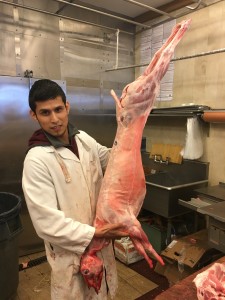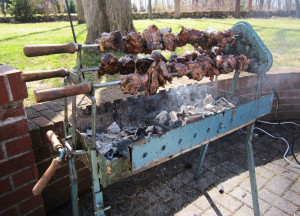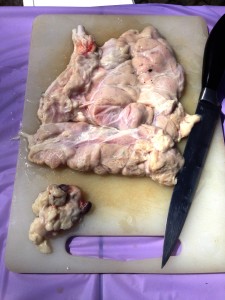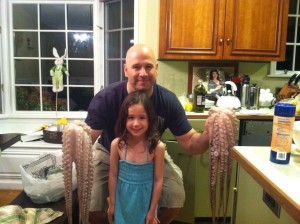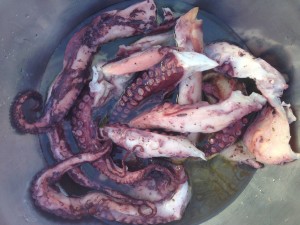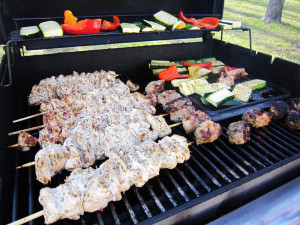

How can Greek Easter save you from Inflammatory bowel disease like Crohn’s and Ulcerative Colitis?
Posted on May 3, 2016 by Dr. G
I want to share with you the healthy rationale behind our traditional Greek Orthodox Easter feast and how it can impact inflammatory bowel disease. The inspiration for this post came from one of my guests. Growing up the son of Greek immigrants in Queens NY, it is hard to tell who in the community is family or not family. If we were childhood friends and our parents were Greek, we were basically cousins, even if there was no blood relation. Two of my favorite relatives were Aunt Elena and Uncle Theodore. Elena, Theodore, and my parents were dear friends since the mid 1950’s. They partied and danced together for nearly 30 years before Elena and Theodore retired back to Greece.
During those years, Elena and Theodore’s children, my brothers, and I were like cousins. After they moved back to Greece, we lost touch with their family. Thanks to Facebook, we reconnected and I invited Elena and Theodore’s sons, Spiro and Yanni, over to the house for Easter. It was as if 25 years ago was yesterday.
When Spiro showed up to the house, he had a bag in his hand, gifts of course for the hosts, and a small package of food for himself. You see, Spiro is not a picky eater by choice. He had very good reason to think ahead about the food he was going to be able to eat in a social setting. However, once he saw what we had cooking on the multiple grills, he felt he could relax.
Spiro was an athlete as a young adult, NCAA collegiate soccer player and amateur cyclist. 12 years ago while in his early thirties, Spiro began to have serious trouble with his digestion. It wasn’t long before he was diagnosed with a “Crohn’s like disorder”. It was labeled Crohn’s, but after several years, many medications and 5 surgeries later, Spiro was positive his doctors didn’t know what they were doing. He had lost the lower third of his small intestine to surgery, and the symptoms and complications continued to mount. He said he was not willing to continue living this way and contemplated suicide.
Sometimes this is what it takes to get people to think differently and decide to take their life into their own hands. Spiro began to study more and more about health. Being an athlete, he thought he knew a lot. It turns out everything he learned from hospital nutritionists, doctors, and classes he took in college was wrong and was causing his own demise. Contemporary wisdom was failing him.
Spiro decided to make some changes and think outside the box of nutrition. Within 2 weeks of deciding to eat nothing but healthy fats, meats, and vegetables without any fruits, sugar, or carbohydrates of any kind, he began to feel better. Finally, his blockages cleared up after years of formed bowel movements. Ahh, the little things in life that can make us happy.
Spiro spends most of the time in a state of ketosis, a deliberate way of eating that results in the efficient use of fatty acids and protein for energy instead of sugar. He said he was shocked when he saw his energy, cognitive function, and sleep all improve. He had decreased pain and brain fog, and most importantly, the depression that gripped him to the point of contemplating suicide lifted.
Each component of the meal my wife, Maria, and I have been preparing for the past decade, since my Uncle George passed on his knowledge to me when we bought our home in Northern NJ, was consistent with the diet that restored Spiro’s health. After several months of returning to normal function and health, Spiro had a visit with his gastroenterologist who had not been aware of the changes he was making. The doctor was there to discuss beginning a new course with medication called Humera, an immune suppressing drug that has a dangerous long list of side effects. Spiro explained that he no longer needed to take any of the old drugs or the new drugs. He explained to the doctor how he thought he may have cured himself.
Spiro asked the doctor why he had not been given this option a long time ago, before the surgeries. He was shocked and angered when he saw the doctor had no idea what he was talking about as if diet and nutrition meant nothing to him. Spiro swore he was never going to consult a doctor again on the subject of health. Isn’t that an amazing statement to make in 2016.
So what exactly did Spiro see at our holiday feast that made him feel at ease to eat with us, knowing that the food was going to contribute to his ongoing health.
Lamb. A grass fed, pastured, hormone, and antibiotic free animal that was free to roam an open pasture before making it to our home. Saturday morning, I had put all of the lamb meat into a brine. I let the lamb brine for nearly 6 hours. I then prepared the marinade with fresh organic, rosemary, thyme, oregano, garlic, the juice of over 20 lemons infused into extra virgin cold pressed olive oil, and a bit of red wine. The lamb marinated overnight. The next morning, the 30 pound lamb was put onto 6 large skewers and placed high over the heat of real wood charcoal for 5 hours.
This slow cooking process of the lamb made the tender meat fall off the bone with flavor that is only better in the mountain villages of Greece. The marinade and slow cooking process breaks down the muscle fibers making them easy to digest, something a struggling digestive system (or any digestive system) would benefit from.
Lamb has wonderful portions of meat that can be lean or fatty. The fatty portions are the most tasty in my opinion, and it is the type of fat that is good for you. When a pastured animal is fed its natural diet of grass on a pasture, the fat the animal produces is of the omega 3 type (EPA/DHA) which is the type of fat that coats and protects your brain. Omega 6 fat is from animals that are fed grain, and our culture is toxic with omega 6 and deficient in omega 3.
- Sweetbreads (glykadakia) and Liver. These are neither sweet nor is it bread. I have no idea nor do I care where this name comes from. In this case we are talking about the thymus gland- the origin of the T-cells of the animal’s immune system. Located below the thyroid and above the breastbone, the thymus gland is a multi-lobulated organ meat.
Organ meats should be derived from non-medicated animals that are pastured (free to roam in their own natural environment). We do not want to eat the organs of an animal that was given antibiotics, exogenous hormones, or confined in an unnatural feeding environment (CAFO- confined animal feeding operation).
Organ meats are considered superfoods- rich in nutrients that exceed muscle tissue by 10 times in some cases of fat soluble vitamins like A,D,E, and K. Other nutrients include the Heme or bioavailable form of iron, vitamin B12. Both heme source iron and vitamin B12 are essential to the proper delivery of oxygen to all of our cells. Choline is a key component to the production of neurotransmitters and other hormones. coQ10 develops brain and heart health, as well as purines that provide our DNA the raw materials to repair.
Vitamin A is essential to the production of Immunoglobulin A, which is immune component that lines the GI tract- the very place where the immune system fails people with irritable bowel disease.
- Octopus and Calamari. If you have not experienced traditional Greek style sauteed and grilled calamari (not fried) made simply with oregano, olive oil, sea salt, and pepper, you are missing a great treat. You can close your eyes while you take a bite, and when you open them, you are going to be transported to a Mediterranean sunset on the beach. The key is to tenderize the octopus in your modern kitchen. You don’t have the luxury of throwing the octopus against a rock 100 times and hanging it on a clothesline for 3 days in the sun on a Greek Isle.
Octopus and calamari are also very rich in Omega 3 fat. As a matter of fact, they have a ration of EPA/DHA that strongly favors DHA, the half of the equation that is so important to our brain function. 60% of brain tissue is made of Omega 3 fat, mostly DHA. This type of fat is massively anti inflammatory.
- Grilled Vegetables (Organic). Grilled veggies are lightly seasoned with a drizzle of olive oil after they have been taken off of the grill. Avoid excessive heat exposure of the olive oil when possible.
It’s always important to balance a high protein meal with fat and vegetables. The more colors the better. The phytonutrients that give veggies their color are essential to maintain the antioxidant needs of the body. Vegetables do not tip the sugar balance in an unfavorable direction the way fruits do.
Just as important as to what is being eaten is what is not being eaten. As you can imagine, grains, beans/legumes, dairy, sugar, corn, breads, pastas, and rice are certainly part of the Greek culture. However, in my opinion, those are things that we all can do without, especially if ketosis and the above mentioned foods can save you from a life of misery, surgery, medication, or worse. The foods that are left out of this diet are precisely the type of foods that result in immune reactions that are so dangerous with inflammatory bowel disease.
The foods in the feast that are so helpful are foods that are not only nutrient dense, but they are also immune neutral, and therefore, flare ups do not have to occur. Discovering what those foods are can be a challenge and working with an experienced functional medicine doctor can make that process simpler, shorter, and with less damage and suffering.
Thanks for reading!

